短暂性动词转化成延续性动词
短暂性动词与延续性动词的转化
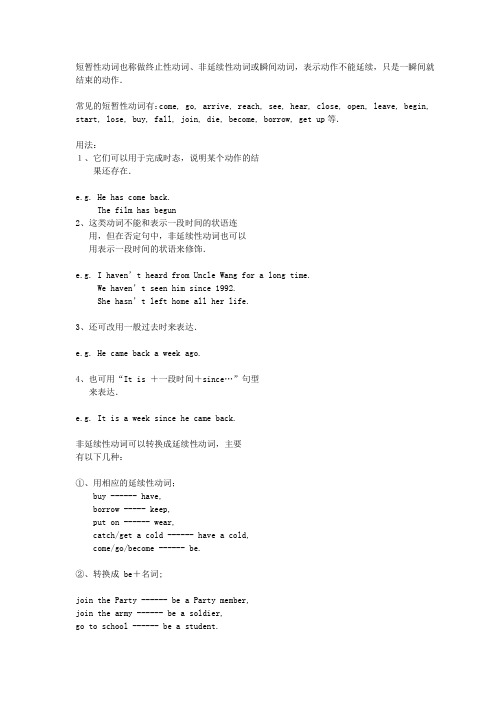
短暂性动词也称做终止性动词、非延续性动词或瞬间动词,表示动作不能延续,只是一瞬间就结束的动作.常见的短暂性动词有:come, go, arrive, reach, see, hear, close, open, leave, begin, start, lose, buy, fall, join, die, become, borrow, get up等.用法:1、它们可以用于完成时态,说明某个动作的结果还存在.e.g. He has come back.The film has begun2、这类动词不能和表示一段时间的状语连用,但在否定句中,非延续性动词也可以用表示一段时间的状语来修饰.e.g. I haven’t heard from Uncle Wang for a long time.We haven’t seen him since 1992.She hasn’t left home all her life.3、还可改用一般过去时来表达.e.g. He came back a week ago.4、也可用“It is +一段时间+since…”句型来表达.e.g. It is a week since he came back.非延续性动词可以转换成延续性动词,主要有以下几种:①、用相应的延续性动词;buy ------ have,borrow ----- keep,put on ------ wear,catch/get a cold ------ have a cold,come/go/become ------ be.②、转换成 be+名词;join the Party ------ be a Party member,join the army ------ be a soldier,go to school ------ be a student.③、转换成be + 介词短语 :go to school ------ be in school,join the army ------ be in the army.④、转换成be + adj./adv. :die ------ be dead, finish ------ be over,begin/start ------ be on, leave (…) ------ be away (from),close ------ be closed, open ------ be open,fall asleep ------ be asleep.巩固练习:(同义转换,每空一词)1.Li Lei joined the Party three years ago.Li Lei ()()()the Party ()three years ago.2009-11-20 04:54回复210.45.224.* 2楼Li Lei ()()()the Party()three years.() three years () Li Lei joined the Party.Three years ()()() Li Lei joined the Party.2.My father left Gucheng last week.My father ()()()() Gucheng () last week.My father ()()()() Gucheng () a week.3.The factory opened in 1996.The factory ()()()() ten years.The factory ()()() since 1996.4. His grandfather died five years ago.His grandfather ()()()since ()()() .His grandfather ()()()()five years.()five years ()his grandfather died.Five years ()()()his grandfather died.5. Mr. Wang reached Beijing five days ago.Mr. Wang ()()() Beijing()five days ago.Mr. Wang ()()() Beijing()five days.6. The film began ten minutes ago.The film ()()()for()().The film ()()()since ()()().答案1.has been in,sincehas been in,forIt's,sincehas passed since2.has been away from,sincehas been away from,for3.has been open forhas been open4.has been dead,five years agohas been dead forIt’s,sincehas passed since5.has been in,sincehas been in,for6.has been on,ten minuteshas been on,ten minutes ago7.has had,forhas had,since8.has kept,forhas kept,since9.has been,forhas been in,since10.have been in,forhave been in,since11.has been asleep,half an hourhas been asleep,half an hour ago请所有来过的人顶我下吧,毕竟打这么多也不容易...短暂性动词,延续性动词和现在完成时短暂性动词是指动作一旦发生就立即结束。
现在完成时中短暂性动词变延续性动词归纳表

延续性动词与非延续性动词及其转换之樊仲川亿创作动词按其动作产生的方法、产生过程的长短可分为延续性动词与非延续性动词.一.延续性动词暗示能够延续的动作,如:learn, work, stand, lie, know, walk, keep, have, wait, watch, sing, read, sleep, live, stay等.延续性动词可以与暗示时间段的状语连用.暗示时间段的短语有: ⑴ for+一段时间, 如:for 2 years; ⑵since从句, 如since he came here; since+过去时间点名词, 如 since last year, since 5 days ago.例: He has lived here for 6 years.You can keep the book for 5 days.二.非延续性动词也称终止性动词、瞬间动词, 暗示不克不及延续的动作,这种动作产生后立即结束.如:open, die, close, begin, finish, come, go, move, borrow, lend, buy等.非延续性动词在肯定句中与暗示时间点的状语连用,如:two years ago; at 5 o'clock;例:He died 5 years ago.三.延续性动词与非延续性动词之间的转换:(考试重点)例:He left five minutes ago. = He has been away for five minutes.这句话的意思是指他离开的动作是5分钟之前产生的,是过去时.也就是说从他离开到现在已经有五分钟了,这个动作是延续的,要用现在完成时,并且要把原来的短暂性动词改成延续性动词.一些短暂性动词及相应的延续性动词:arrive(get to /reach)→be here (in)begin(start)→be ondie →be deadcomehere(back)→be here(back)leave →be away (from)fall ill(sick, asleep)→be ill(sick, asleep)get up→be upgo/ get out(there)→be out(there)fini sh →be overput on →wear 或be onopen →be open(keep sth. open)join →be in或be a member of…+组织机构close →be closedgo to school→be a studentborrow →keepbuy/get →havecatch(a cold)→ have(a cold) get to know →knowbegin to study→studycome to work→workmove to → live infinish→ be overcome to → be insit down → be seatedmarry → be marrieddress → be dressedbecome → be。
把短暂性动词转换为延续性词方法
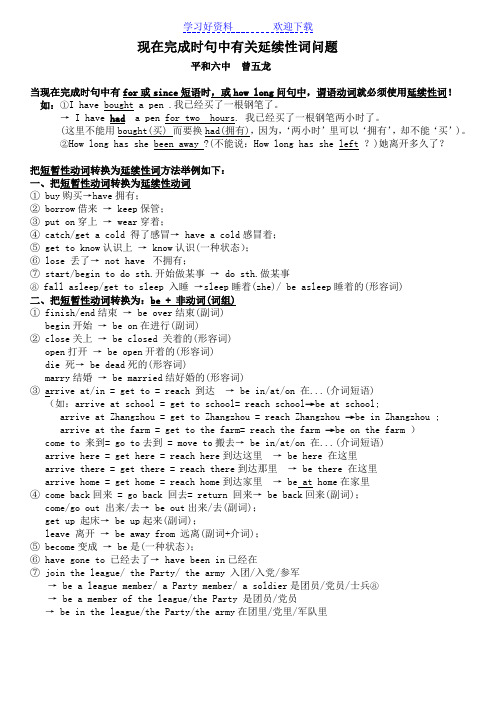
现在完成时句中有关延续性词问题平和六中曾五龙当现在完成时句中有for或since短语时,或how long问句中,谓语动词就必须使用延续性词!如:①I have bought a pen .我已经买了一根钢笔了。
→ I have had a pen for two hours. 我已经买了一根钢笔两小时了。
(这里不能用bought(买) 而要换had(拥有),因为,‘两小时’里可以‘拥有’,却不能‘买’)。
②How long has she been away ?(不能说:How long has she left ?)她离开多久了?把短暂性动词转换为延续性词方法举例如下:一、把短暂性动词转换为延续性动词① buy购买→have拥有;② borrow借来→ keep保管;③ put on穿上→ wear穿着;④ catch/get a cold 得了感冒→ have a cold感冒着;⑤ get to know认识上→ know认识(一种状态);⑥ lose 丢了→ not have不拥有;⑦ start/begin to do sth.开始做某事→ do sth.做某事⑧ fall asleep/get to sleep 入睡→sleep睡着(zhe)/ be asleep睡着的(形容词)二、把短暂性动词转换为:be + 非动词(词组)① finish/end结束→ be over结束(副词)begin开始→ be on在进行(副词)② close关上→ be closed 关着的(形容词)open打开→ be open开着的(形容词)die 死→ be dead死的(形容词)marry结婚→ be married结好婚的(形容词)③ arrive at/in = get to = reach 到达→ be in/at/on 在...(介词短语)(如:arrive at school = get to school= reach school→be at school;arrive at Zhangzhou = get to Zhangzhou = reach Zhangzhou →be in Zhangzhou ;arrive at the farm = get to the farm= reach the farm →be on the farm )come to 来到= go to去到 = move to搬去→ be in/at/on 在...(介词短语)arrive here = get here = reach here到达这里→ be here 在这里arrive there = get there = reach there到达那里→ be there 在这里arrive home = get home = reach home到达家里→ be at home在家里④ come back回来 = go back 回去= return 回来→ be back回来(副词);come/go out 出来/去→ be out出来/去(副词);get up 起床→ be up起来(副词);leave 离开→ be away from 远离(副词+介词);⑤ become变成→ be是(一种状态);⑥ have gone to 已经去了→ have been in已经在⑦ join the league/ the Party/ the army 入团/入党/参军→ be a league member/ a Party member/ a soldier是团员/党员/士兵⑧→ be a member of the league/the Party 是团员/党员→ be in the league/the Party/the army在团里/党里/军队里按要求把短暂性动词转换为延续性词的练习A.1)He got to Beijing five minutes ago.He ________ _________ _________ Beijing for _________ _________.2)I moved to the USA last year.I ________ ________ __________ the USA since __________ __________.3)I went home yesterday.I _______ ________ _________ home for _________ __________.4)They came here last week.They _________ _________ here since _________ __________.B.1)He came out two years ago.He _________ __________ _________ for __________ __________.2)We return to Fuzhou yesterday.We ________ ________ _________ to Fuzhou since __________.C.1)I became a teacher in 2000.I ________ __________ a teacher for _________ _________.2)The river became dirty last year.The river _________ _________ dirty for _________ __________.D.1)The shop closed two hours ago.The shop ________ _________ _________ for _________ _________.2)The door opened at six in the morning.The door ________ ________ ________ for six hours.E.1)I got up two hours ago.I ________ ________ ________ since ________ ________.2)He left Fuzhou just now.He _______ ________ ________ _________ Fuzhou for five minutes.3)My grandpa died in 2002.My grandpa _______ _______ ________for _______ ________.4)The meeting finished at six.The meeting ________ ______ ______ for six hours.5)I got to sleep two hours ago.I ________ _________ _________ since _________ __________.6)They married in 1990.They ________ _________ __________since _________.F.1)I began to teach at this school in 1995.I ____ ____ at this school since ____.2)The film began two minutes ago.The film ____ ____ ____ for ____ ____.G.1)They borrowed it last week.They _________ _________ it since __________ __________.2)I bought a pen two hours ago.I _________ _________ a pen for ________ __________.3)I got to know him last year.I _________ __________ him since __________ __________.4)I put on my glasses three years ago.I __________ __________ my glasses for _________ _________.H.1)He has gone to Beijing.He ____ ____ _____ Beijing for two days.I.1)He joined the league in 2002.He ________ _________ a _________ _________ for two years.He ________ __________ a __________ ___________ the __________ for two years.He ____________ ___________ ___________ the league for two years.2)My brother joined the army two years ago.My brother __________ __________ a ___________ for ___________ ___________.My brother ___________ ___________ in ____________ ___________ for two years.答案按要求把短暂性动词转换为延续性词(当句中有for或since短语时就必须转换为延续性词) A.1)He got to Beijing five minutes ago. 他五分钟前到达北京的。
现在完成时中短暂性动词变延续性动词归纳表
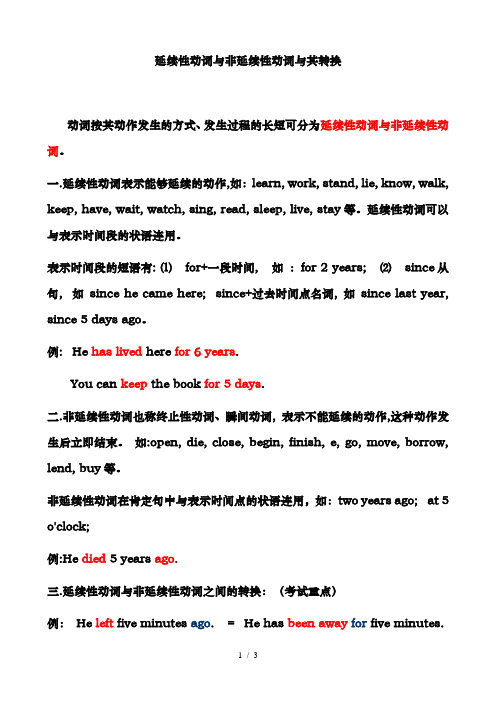
延续性动词与非延续性动词与其转换动词按其动作发生的方式、发生过程的长短可分为延续性动词与非延续性动词。
一.延续性动词表示能够延续的动作,如:learn, work, stand, lie, know, walk, keep, have, wait, watch, sing, read, sleep, live, stay等。
延续性动词可以与表示时间段的状语连用。
表示时间段的短语有: ⑴for+一段时间, 如:for 2 years; ⑵since从句, 如since he came here; since+过去时间点名词, 如since last year, since 5 days ago。
例: He has lived here for 6 years.You can keep the book for 5 days.二.非延续性动词也称终止性动词、瞬间动词, 表示不能延续的动作,这种动作发生后立即结束。
如:open, die, close, begin, finish, e, go, move, borrow, lend, buy等。
非延续性动词在肯定句中与表示时间点的状语连用,如:two years ago; at 5 o'clock;例:He died 5 years ago.三.延续性动词与非延续性动词之间的转换:(考试重点)例:He left five minutes ago. = He has been away for five minutes.这句话的意思是指他离开的动作是5分钟之前发生的,是过去时。
也就是说从他离开到现在已经有五分钟了,这个动作是延续的,要用现在完成时,并且要把原来的短暂性动词改为延续性动词。
一些短暂性动词与相应的延续性动词:arrive(get to /reach)→ be here (in)begin(start) → be ondie → be deade here(back)→be here(back)leave → be away (from)fall ill(sick, asleep)→be ill(sick, asleep)get up→ be upgo/ get out(there)→ be out(there)finish → be ov erput on → wear 或be onopen → be open(keep sth. open)join → be in或be a member of…+组织机构close → be closedgo to school → be a studentborrow →keepbuy/get →havecatch(a cold) → have(a cold)get to know → know begin to study → study e to work → wor k move to → live in finish→ be overe to → be insit down → be seated marry → be married dress → be dressed bee → be。
现在完成时--短暂性动词变延续性动词
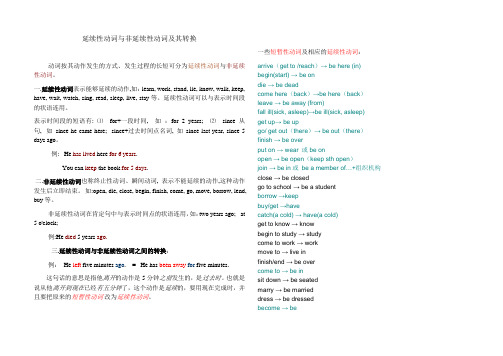
延续性动词与非延续性动词及其转换动词按其动作发生的方式、发生过程的长短可分为延续性动词与非延续性动词。
一.延续性动词表示能够延续的动作,如:learn, work, stand, lie, know, walk, keep, have, wait, watch, sing, read, sleep, live, stay等。
延续性动词可以与表示时间段的状语连用。
表示时间段的短语有: ⑴for+一段时间, 如:for 2 years; ⑵since从句, 如since he came here; since+过去时间点名词, 如since last year, since 5 days ago。
例: He has lived here for 6 years.You can keep the book for 5 days.二.非延续性动词也称终止性动词、瞬间动词, 表示不能延续的动作,这种动作发生后立即结束。
如:open, die, close, begin, finish, come, go, move, borrow, lend, buy等。
非延续性动词在肯定句中与表示时间点的状语连用,如:two years ago; at 5 o'clock;例:He died 5 years ago.三.延续性动词与非延续性动词之间的转换:例:He left five minutes ago. = He has been away for five minutes.这句话的意思是指他离开的动作是5分钟之前发生的,是过去时。
也就是说从他离开到现在已经有五分钟了,这个动作是延续的,要用现在完成时,并且要把原来的短暂性动词改为延续性动词。
一些短暂性动词及相应的延续性动词:arrive(get to /reach)→ be here (in) begin(start) → be ondie → be deadcome here(back)→be here(back)leave → be away (from)fall ill(sick, asleep)→be ill(sick, asleep)get up→ be upgo/ get out(there)→ be out(there)finish → be overput on → wear 或be onopen → be open(keep sth open)join → be in或be a member of…+组织机构close → be closedgo to school → be a studentborrow →keepbuy/get →havecatch(a cold) → have(a cold)get to know → knowbegin to study → studycome to work → workmove to → live infinish/end → be overcome to → be insit down → be seatedmarry → be marrieddress → be dressedbecome → be。
(完整版)现在完成时中短暂性动词变延续性动词归纳表
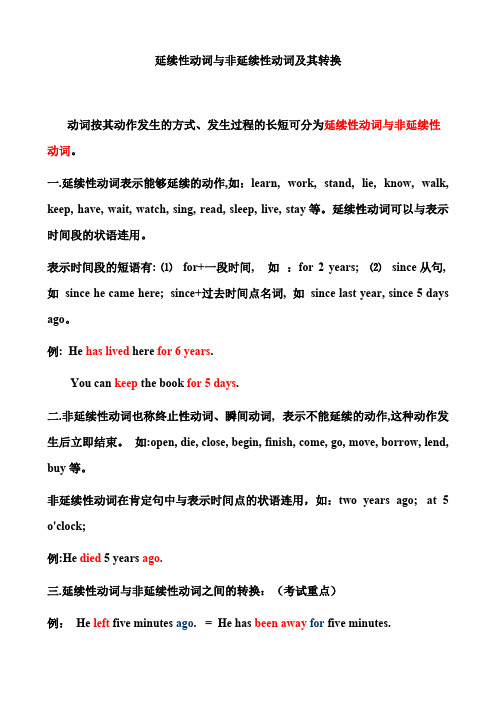
延续性动词与非延续性动词及其转换动词按其动作发生的方式、发生过程的长短可分为延续性动词与非延续性动词。
一.延续性动词表示能够延续的动作,如:learn, work, stand, lie, know, walk, keep, have, wait, watch, sing, read, sleep, live, stay等。
延续性动词可以与表示时间段的状语连用。
表示时间段的短语有: ⑴for+一段时间, 如:for 2 years; ⑵since从句, 如since he came here; since+过去时间点名词, 如since last year, since 5 days ago。
例: He has lived here for 6 years.You can keep the book for 5 days.二.非延续性动词也称终止性动词、瞬间动词, 表示不能延续的动作,这种动作发生后立即结束。
如:open, die, close, begin, finish, come, go, move, borrow, lend, buy等。
非延续性动词在肯定句中与表示时间点的状语连用,如:two years ago; at 5 o'clock;例:He died 5 years ago.三.延续性动词与非延续性动词之间的转换:(考试重点)例:He left five minutes ago. = He has been away for five minutes.这句话的意思是指他离开的动作是5分钟之前发生的,是过去时。
也就是说从他离开到现在已经有五分钟了,这个动作是延续的,要用现在完成时,并且要把原来的短暂性动词改为延续性动词。
一些短暂性动词及相应的延续性动词:arrive(get to /reach)→ be here (in)begin(start) → be ondie → be deadcome here(back)→be here(back)leave → be away (from)fall ill(sick, asleep)→be ill(sick, asleep)get up→ be upgo/ get out(there)→ be out(there)finish → be overput on → wear 或be onopen → be open(keep sth. open)join → be in或be a member of…+组织机构close → be closedgo to school → be a studentborrow →keepbuy/get →havecatch(a cold) → have(a cold)get to know → know begin to study → study come to work → work move to → live in finish → be over come to → be insit down → be seated marry → be married dress → be dressed become → be。
初中英语短暂性动词转换为延续性动词
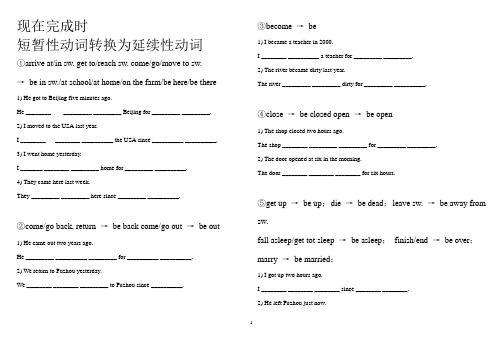
现在完成时短暂性动词转换为延续性动词①arrive at/in sw. get to/reach sw. come/go/move to sw.→be in sw./at school/at home/on the farm/be here/be there 1) He got to Beijing five minutes ago.He ________ _________ _________ Beijing for _________ _________.2) I moved to the USA last year.I ________ ________ __________ the USA since __________ __________.3) I went home yesterday.I _______ ________ _________ home for _________ __________.4) They came here last week.They _________ _________ here since _________ __________.②come/go back, return →be back come/go out →be out1) He came out two years ago.He _________ __________ _________ for __________ __________.2) We return to Fuzhou yesterday.We ________ ________ _________ to Fuzhou since __________. ③become →be1) I became a teacher in 2000.I ________ __________ a teacher for _________ _________.2) The river became dirty last year.The river _________ _________ dirty for _________ __________.④close →be closed open →be open1) The shop closed two hours ago.The shop ________ _________ _________ for _________ _________.2) The door opened at six in the morning.The door ________ ________ ________ for six hours.⑤get up →be up;die →be dead;leave sw. →be away from sw.fall asleep/get tot sleep →be asleep;finish/end →be over;marry →be married;1) I got up two hours ago.I ________ ________ ________ since ________ ________.2) He left Fuzhou just now.He _______ ________ ________ _________ Fuzhou for five minutes.3) My grandpa died in 2002.My grandpa _______ _______ ________for _______ ________.4) The meeting finished at six.The meeting ________ ______ ______ for six hours.5) I got to sleep two hours ago.I ________ _________ _________ since _________ _________.6) They married in 1990.They ________ _________ __________since _________.⑥start/begin to do sth. →do sth. ;begin →be on1) I began to teach at this school in 1995.I ____ ____ at this school since ____.2) The film began two minutes ago.The film ____ ____ ____ for ____ ____.⑦borrow →keep;lose →not have ;buy →have ;put on →wearcatch/get a cold →have a cold;get to know →know1) They borrowed it last week.They _________ _________ it since __________ __________. 2) I bought a pen two hours ago.I _________ _________ a pen for ________ __________.3) I got to know him last year.I _______ _______ him since __________ __________.4) I put on my glasses three years ago.I __________ __________ my glasses for _________ _________.⑧have/has gone to →have been inHe has gone to Beijing.He ____ ____ _____ Beijing for two days.⑨join the league/the Party/the army→be a league/a Party member/a soldier→be a member of the league/the Party→be in the league/the Party/the army1) He joined the league in 2002.He ________ _________ a _________ _________ for two years.He _______ _________ a __________ ___________ the __________ for two years. He ____________ ___________ ___________ the league for two years.2) My brother joined the army two years ago.My brother ________ __________ a ___________ for ___________ ___________. My brother __________ ___________ in ____________ ___________ for two years.。
现在完成时中短暂性动词变延续性动词归纳表

延续性动词与非延续性动词及其转换动词按其动作发生的方式、发生过程的长短可分为延续性动词与非延续性动词。
一.延续性动词表示能够延续的动作,如:learn, work, stand, lie, know, walk, keep, have, wait, watch, sing, read, sleep, live, stay等。
延续性动词可以与表示时间段的状语连用。
表示时间段的短语有: ⑴for+一段时间, 如:for 2 years; ⑵since从句, 如since he came here; since+过去时间点名词, 如since last year, since 5 days ago。
例: He has lived here for 6 years.You can keep the book for 5 days.二.非延续性动词也称终止性动词、瞬间动词, 表示不能延续的动作,这种动作发生后立即结束。
如:open, die, close, begin, finish, come, go, move, borrow, lend, buy等。
非延续性动词在肯定句中与表示时间点的状语连用,如:two years ago; at 5 o'clock;例:He died 5 years ago.三.延续性动词与非延续性动词之间的转换:(考试重点)例:He left five minutes ago. = He has been away for five minutes.这句话的意思是指他离开的动作是5分钟之前发生的,是过去时。
也就是说从他离开到现在已经有五分钟了,这个动作是延续的,要用现在完成时,并且要把原来的短暂性动词改为延续性动词。
一些短暂性动词及相应的延续性动词:arrive(get to /reach)→ be here (in)begin(start) → be ondie → be deadcome here(back)→be here(back)leave → be away (from)fall ill(sick, asleep)→be ill(sick, asleep)get up→ be upgo/ get out(there)→ be out(there)finish → be overput on → wear 或be onopen → be open(keep sth. open)join → be in或be a member of…+组织机构close → be closedgo to school → be a studentborrow →keepbuy/get →havecatch(a cold) → have(a cold)get to know → know begin to study → study come to work → work move to → live in finish → be over come to → be insit down → be seated marry → be married dress → be dressed become → be。
现在完成时--短暂性动词变延续性动词
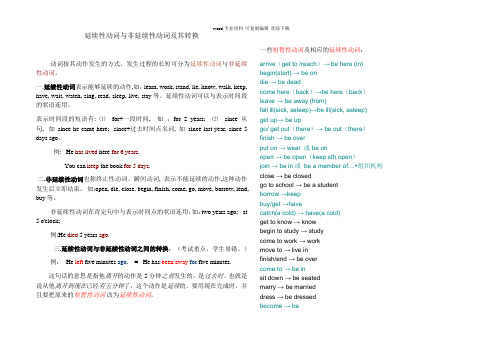
word专业资料-可复制编辑-欢迎下载延续性动词与非延续性动词及其转换动词按其动作发生的方式、发生过程的长短可分为延续性动词与非延续性动词。
一.延续性动词表示能够延续的动作,如:learn, work, stand, lie, know, walk, keep, have, wait, watch, sing, read, sleep, live, stay等。
延续性动词可以与表示时间段的状语连用。
表示时间段的短语有: ⑴for+一段时间, 如:for 2 years; ⑵since从句, 如since he came here; since+过去时间点名词, 如since last year, since 5 days ago。
例: He has lived here for 6 years.You can keep the book for 5 days.二.非延续性动词也称终止性动词、瞬间动词, 表示不能延续的动作,这种动作发生后立即结束。
如:open, die, close, begin, finish, come, go, move, borrow, lend, buy等。
非延续性动词在肯定句中与表示时间点的状语连用,如:two years ago; at 5 o'clock;例:He died 5 years ago.三.延续性动词与非延续性动词之间的转换:(考试重点,学生易错。
)例:He left five minutes ago. = He has been away for five minutes.这句话的意思是指他离开的动作是5分钟之前发生的,是过去时。
也就是说从他离开到现在已经有五分钟了,这个动作是延续的,要用现在完成时,并且要把原来的短暂性动词改为延续性动词。
一些短暂性动词及相应的延续性动词:arrive(get to /reach)→ be here (in) begin(start) → be ondie → be deadcome here(back)→be here(back)leave → be away (from)fall ill(sick, asleep)→be ill(sick, asleep)get up→ be upgo/ get out(there)→ be out(there)finish → be overput on → wear 或be onopen → be open(keep sth open)join → be in或be a member of…+组织机构close → be closedgo to school → be a studentborrow →keepbuy/get →havecatch(a cold) → have(a cold)get to know → knowbegin to study → studycome to work → workmove to → live infinish/end → be overcome to → be insit down → be seatedmarry → be marrieddress → be dressedbecome → be。
短暂性动词与延续性动词的转换

短暂性动词与延续性动词的转换①arrive at/in sw. get to/reach sw. come/go/move to sw.→be in sw./at school/at home/on the farm/be here/be there1) He got to Beijing five minutes ago.He has been in Beijing for five minutes.2) I moved to the USA last year.I have been in the USA since last year.I have been at home for one day.4) They came here last week.They have been here since _________ __________.②come/go back, return →be back come/go out →be out1) He came out two years ago.He _________ __________ _________ for __________ __________.2) We return to Fuzhou yesterday.We ________ ________ _________ to Fuzhou since __________.③become →be1) I became a teacher in 2000.I _____ ______ a teacher for ___ ____.2) The river became dirty last year.The river _________dirty for ______④close →be closed open →be openThe shop _____ _____ ______ for ____ ______.2) The door opened at six in the morning.The door___ ____ ____ for six hours.⑤get up →be up;die →be dead;leave sw. →be away from sw. fall asleep/get to sleep →be asleep;finish/end →be over;marry →be married;1) I got up two hours ago.I ___ __ ___ since __ _____.2) He left Fuzhou just now.He ____ ____ _____ _____ Fuzhou for five minutes.3) My grandpa died in 2002.My grandpa __ ____ _____for ___ _____.4) The meeting finished at six.The meeting _ _ _ for six hours.5) I got to sleep two hours ago.I _ __ __ since ___ __.6) They married in 1990.They __ _ __since__.⑥start/begin to do sth. →do sth. ;begin →be on1) I began to teach at this school in 1995.I __ __ at this school since ___.The film ____ ____ ____ for ____ ____.⑦borrow →keep;lose →not have ;buy →have ;put on →wear catch/get a cold →have a cold;get to know →know1) They borrowed it last week.They --it since ____ ___.2) I bought a pen two hours ago.I ___ ___ a pen for __ __.3) I got to know him last year.I ___ ____ him since ____ _.4) I put on my glasses three years ago.I ____ my glasses for ----⑧have/has gone to →have been inHe has gone to Beijing.He __ __ ___ Beijing for two days.⑨join the league/the Party/the army→be a league/a Party member/a soldier→be a member of the league/the Party→be in the league/the Party/the army1) He joined the league in 2002.He __ __ a ___ ___ for two years.He _ ___ a ___ __ th____ for two years.He ___ ___ __ the league for two years.2) My brother joined the army two years ago.My brother __ ____ a ____ for_____ __.My brother ___ _____ in _____ ______ for two years.Keys:①1) has,been,in,five,minutes2) have,been,in,last,year3) have,been,in,one,day4) have,been,last,week②1) has,been,out,two,years2) have,been,back,yesterday③1) have,been,nine,years2) has,been,one,year④1) has,been,closed,two,hours2) has,been,open⑤1) have,been,up,two,hours,ago2) have,been,away,from3) has,been,dead,seven,years4) has,been,over5) have,been,asleep,two,hours,ago6) have,been,married,1990⑥1) have,taught,19952) has,been,on,two,minutes⑦1) have,kept,last,week2) have,had,two,hours3) have,knowm,last,year4) have,worn,three,years⑧has,been,in⑨1)has,been,league,memberhas,been,member,of,league has,been,in2)has,been,soldier,two,yearshas,been,the,army。
短暂性动词与延续性动词的转化

短暂性动词也称做终止性动词、非延续性动词或瞬间动词,表示动作不能延续,只是一瞬间就结束的动作.常见的短暂性动词有:come, go, arrive, reach, see, hear, close, open, leave, begin, start, lose, buy, fall, join, die, become, borrow, get up等.用法:1、它们可以用于完成时态,说明某个动作的结果还存在.e.g. He has come back.The film has begun2、这类动词不能和表示一段时间的状语连用,但在否定句中,非延续性动词也可以用表示一段时间的状语来修饰.e.g. I haven’t heard from Uncle Wang for a long time.We haven’t seen him since 1992.She hasn’t left home all her life.3、还可改用一般过去时来表达.e.g. He came back a week ago.4、也可用“It is +一段时间+since…”句型来表达.e.g. It is a week since he came back.非延续性动词可以转换成延续性动词,主要有以下几种:①、用相应的延续性动词;buy ------ have,borrow ----- keep,put on ------ wear,catch/get a cold ------ have a cold,come/go/become ------ be.②、转换成 be+名词;join the Party ------ be a Party member,join the army ------ be a soldier,go to school ------ be a student.③、转换成be + 介词短语 :go to school ------ be in school,join the army ------ be in the army.④、转换成be + adj./adv. :die ------ be dead, finish ------ be over,begin/start ------ be on, leave (…) ------ be away (from),close ------ be closed, open ------ be open,fall asleep ------ be asleep.巩固练习:(同义转换,每空一词)1.Li Lei joined the Party three years ago.Li Lei ()()()the Party ()three years ago.2009-11-20 04:54回复210.45.224.* 2楼Li Lei ()()()the Party()three years.() three years () Li Lei joined the Party.Three years ()()() Li Lei joined the Party.2.My father left Gucheng last week.My father ()()()() Gucheng () last week.My father ()()()() Gucheng () a week.3.The factory opened in 1996.The factory ()()()() ten years.The factory ()()() since 1996.4. His grandfather died five years ago.His grandfather ()()()since ()()() .His grandfather ()()()()five years.()five years ()his grandfather died.Five years ()()()his grandfather died.5. Mr. Wang reached Beijing five days ago.Mr. Wang ()()() Beijing()five days ago.Mr. Wang ()()() Beijing()five days.6. The film began ten minutes ago.The film ()()()for()().The film ()()()since ()()().答案1.has been in,sincehas been in,forIt's,sincehas passed since2.has been away from,sincehas been away from,for3.has been open forhas been open4.has been dead,five years agohas been dead forIt’s,sincehas passed since5.has been in,sincehas been in,for6.has been on,ten minuteshas been on,ten minutes ago7.has had,forhas had,since8.has kept,forhas kept,since9.has been,forhas been in,since10.have been in,forhave been in,since11.has been asleep,half an hourhas been asleep,half an hour ago请所有来过的人顶我下吧,毕竟打这么多也不容易...短暂性动词,延续性动词和现在完成时短暂性动词是指动作一旦发生就立即结束。
现在完成时中短暂性动词变延续性动词归纳表版
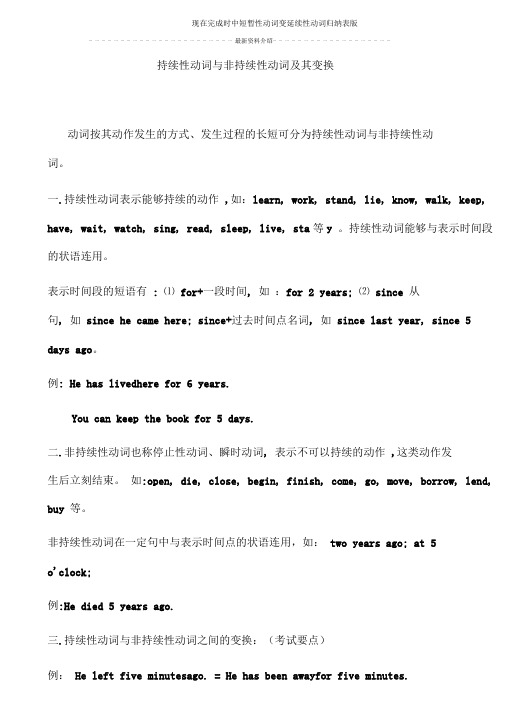
持续性动词与非持续性动词及其变换动词按其动作发生的方式、发生过程的长短可分为持续性动词与非持续性动词。
一.持续性动词表示能够持续的动作,如:learn, work, stand, lie, know, walk, keep, have, wait, watch, sing, read, sleep, live, sta等y 。
持续性动词能够与表示时间段的状语连用。
表示时间段的短语有: ⑴for+一段时间, 如:for 2 years; ⑵since 从句, 如since he came here; since+过去时间点名词, 如since last year, since 5 days ago。
例: He has livedhere for 6 years.You can keep the book for 5 days.二.非持续性动词也称停止性动词、瞬时动词, 表示不可以持续的动作,这类动作发生后立刻结束。
如:open, die, close, begin, finish, come, go, move, borrow, lend, buy 等。
非持续性动词在一定句中与表示时间点的状语连用,如:two years ago; at 5o'clock;例:He died 5 years ago.三.持续性动词与非持续性动词之间的变换:(考试要点)例:He left five minutesago. = He has been awayfor five minutes.这句话的意思是指他走开的动作是 5 分钟以前发生的,是过去时。
也就是说从他走开到此刻已经有五分钟了,这个动作是持续的,要用此刻达成时,并且要把本来的短暂性动词改为持续性动词。
一些短暂性动词及相应的持续性动词:arrive(get to /reach)→be here (in)begin(start)→be ondie →be deadcome here(back)→be here(back)leave →be away (from)fall ill(sick, asleep) →be ill(sick, asleep)get up →be upgo/ get ou(t there)→be out(there)finish →be overput on →wear 或be onopen →be open(keep sth. open)join →be in或be a member of +⋯组织机构close →be closedgo to school→be a studentborrow →keepbuy/get →havecatch(a cold)→have(a cold)get to know k→nowbegin to study→studycome to work→workmove to →live infinish →be overcome to →be insit down →be seatedmarry →be marrieddress →be dressedbecome→be3。
短暂动词对应延续性动词变化
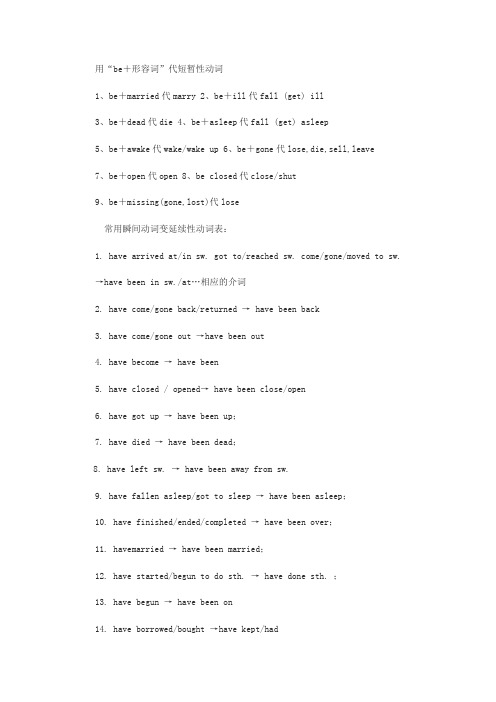
用“be+形容词”代短暂性动词1、be+married代marry2、be+ill代fall (get) ill3、be+dead代die4、be+asleep代fall (get) asleep5、be+awake代wake/wake up6、be+gone代lose,die,sell,leave7、be+open代open 8、be closed代close/shut9、be+missing(gone,lost)代lose常用瞬间动词变延续性动词表:1. have arrived at/in sw. got to/reached sw. come/gone/moved to sw. →have been in sw./at…相应的介词2. have come/gone back/returned → have been back3. have come/gone out →have been out4. have become → have been5. have closed / opened→ have been close/open6. have got up → have been up;7. have died → have been dead;8. have left sw. → have been away from sw.9. have fallen asleep/got to sleep → have been asleep;10. have finished/ended/completed → have been over;11. havemarried → have been married;12. have started/begun to do sth. → have done sth. ;13. have begun → have been on14. have borrowed/bought →have kept/had15. have lost → haven’t had16. have put on →have worn17. have caught /get a cold → have had a cold;18. have got to know → have known19. have/has gone to → have been in20. have joined/have taken part in the league/the Party/the army延续性动词与非延续性动词之间的转换:leave --- be away, borrow --- keep, buy --- have, begin/start --- be on, die --- be dead, finish --- beover, join --- be in+组织机构, be a member of+组织机构, open sth --- keep sth open, fall ill --- be ill, get up---be up, catch a cold ---have a cold, come here --- be here, go there --- be there, become--- be, come back --- be back, fall asleep --- be asleep, getto/ arrive/reach --- be (in), leave --- be away from, get to know--- know, go (get) out →be out,put on→ wear;catch a cold →have acold。
英语中的短暂变延续
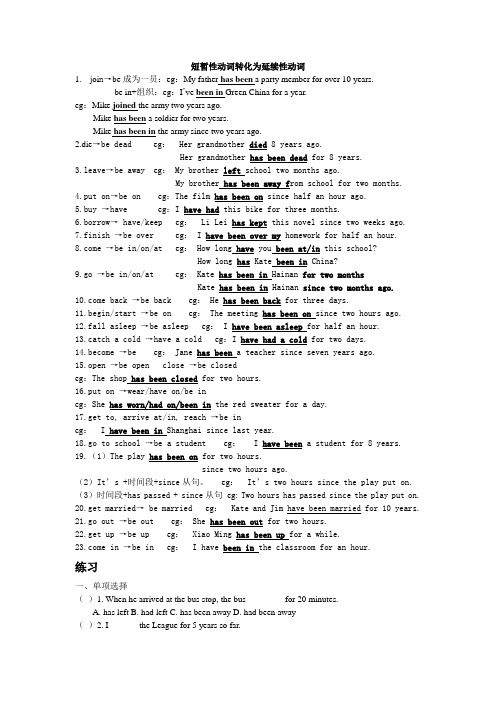
短暂性动词转化为延续性动词1.joi n→be成为一员:eg:My father has been a party member for over 10 years.be in+组织:eg:I’ve been in Green China for a year.eg:Mike joined the army two years ago.Mike has been a soldier for two years.Mike has been in the army since two years ago.2.die→be dead eg: Her grandmother died 8 years ago.Her grandmother has been dead for 8 years.3.leave→be away eg: My brother left school two months ago.My brother has been away f rom school for two months.4.put on→be on eg:The film has been on since half an hour ago.5.buy →have eg:I have had this bike for three months.6.borrow→ have/keep eg: Li Lei has kept this novel since two weeks ago.7.finish →be over eg: I have been over my homework for half an hour.e →be in/on/at eg: How long have you been at/in this school?How long has Kate been in China?9.go →be in/on/at eg: Kate has been in Hainan for two monthsKate has been in Hainan since two months ago.e back →be back eg: He has been back for three days.11.begin/start →be on eg: The meeting has been on since two hours ago.12.fall asleep →be asleep eg: I have been asleep for half an hour.13.catch a cold →have a cold eg:I have had a cold for two days.14.become →be eg: Jane has been a teacher since seven years ago.15.open →be open close →be closedeg:The shop has been closed for two hours.16.put on →wear/have on/be ineg:She has worn/had on/been in the red sweater for a day.17.get to, arrive at/in, reach →be ineg: I have been in Shanghai since last year.18.go to school →be a student eg: I have been a student for 8 years.19.(1)The play has been on for two hours.since two hours ago.(2)It’s +时间段+since从句。
短暂性动词转换成延续性动词

短暂性动词转换成延续性动词arrive in/at;get to;reach----------have/has been in/athave/has been here/therecome/go------- have/has been in/atmove------ have/has been in/atcome back/go back/return-------- have/has been backcome/go out-------- have/has been outbecome-------- have/has beenclose-------- have/has been closedopen---------- have/has been openget up--------- have/has been updie---------- have/has been deadleave--------- have/has been away fromfall asleep-------- have/has been asleepfinish/end------- have/has been overbegin/start-------- have/has been onmarry/get married----- have/has been marriedborrow------ have/has keptbuy-------- have/has hadstart/begin to do-------- have/has donelose-------- have/hasn’t hadput on------have /has worncatch/get a cold------ have/has had a coldget to know----------have/has knownhave gone to-------- have/has been injoin the club------- have/has been in the cluba member of the clubfall ill-------- have/has been ill1.He -------the English-Chinese dictionary for about twenty years,but it is still new.A.has boughtB.has borrowedC.has had2.Simon -------the Football Club since last year.A.has been inB.has joinedC.has been a member ofD.A&C3---.May I speak to your father?--.Sorry,he --------Shanghai.A.has been inB.has been toC. has gone toD. come to同义句转换1.He got to Beijing five minutes ago.He______ ________ _______Beijing for _______ _______.2.I moved to the USA last year.I _______ _______ _______the USA since _______ _______3.I went home yesterday.I _______ _______ _______home for _______ _______4.They came here last week.They _______ _______here since _______ _______5.He went out two hours ago.He _______ _______ _______for _______ _______.6.We returned to Fuzhou last week.We _______ _______ _______ to Fuzhou since _______ _______.7.I became a teacher in 2003.I _______ _______ a teacher for _______ _ ______8.He left China yesterday.He _______ _______ _______ _______ China since _______.9.The shop closed two hours ago.The shop _______ _______ _______ for _______ _______.10.The door opened at six in the morning.The door _______ _______ _______ for six hours.11.I got up two hours ago.I _______ _______ _______ Since _______ _________ ________.12.My grandpa died in 2002.My grandpa _______ _______ _______ for _______ _______.13.The meeting finished/started harf an hour ago.The meeting _______ _______ _______ for half an hour.14.I got to sleep two hours ago.I _______ _______ _______ since _______ _______.15.They married/got married in 1990.They _______ _______ _______ since _______.16.I began to teach at this school in 1995.I _______ _______at this school since 1995.17.The film began five minutes ago.The film _______ _______ _______ for _______ _______.18.They borrowed the book last week.They _______ _______ the book since _______ _______.19.I bought a pen two hours ago.I _______ _______ a pen for _______ _______.20.I got to know him last year.I _______ _______him since _______ _______.21.I put on my glasses ten years ago.I _______ _______ my glasses for _______ _______.22.My father lost his watch three days ago.My father _______ _______ his watch for three days.23.She caught a bad cold last week.She _______ _______ _______ _______ _______ since _______ _______.24.He has gone to Beijing.He _______ _______ _______ Beijing for two days.25.He joined the league in 2002.He _______ _______ a _______ _______ for two yesrs.He _______ _______ a _______ _______the _______ for two years.He _______ _______ _______ the league for two years.26.My brother joined the army two years ago.My brother _______ _______ a _______ since _______ _______ _______. My brother _______ _______ in _______ _______ since _______ _______ _______.。
